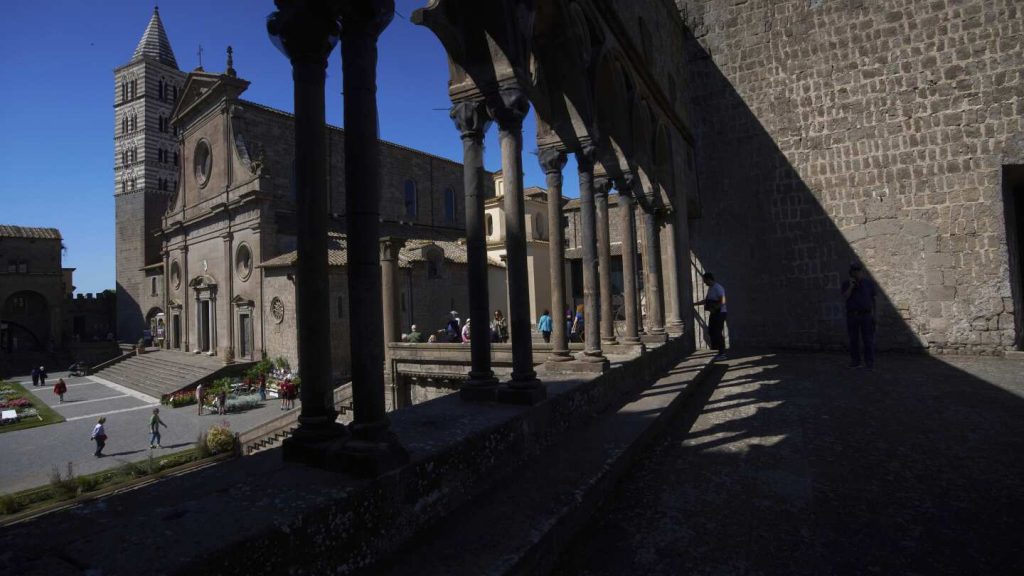VITERBO, Italy (AP) — It was the mounting rage of citizens in Viterbo, a small town north of Rome, that put an end to the longest papal election in the history of the Catholic Church, forging for the first time the word “conclave.”
The Viterbo conclave in the 13th century was a pivotal event in papal elections, lasting almost three years – exactly 1,006 days – due to deep divisions among the cardinals over the name of the new pope.
Viterbo is also considered the birthplace of modern conclaves, where cardinals are confined to a single place until they elect a new pontiff, and often need to negotiate before reaching a compromise on the final name.
In November 1268, the cardinals — summoned in Viterbo to elect the successor of the late Pope Clement IV — were split mainly between two factions and couldn’t reach a consensus before September 1271.
Drastic measures
As the cardinals continued to deliberate in Viterbo, frustration rose among locals due to the lack of progress, as political and internal struggles had cast a shadow over the election.
Those divisions stemmed from the cardinals’ allegiance to competing parties, mainly supporters of the papacy and the Holy Roman Empire. That was further complicated by personal and family ties, making any agreement on the pope’s election extremely difficult.
The electing marathon led citizens ,who at the time had to pay for the cardinals’ room and board expenses, to resort to drastic measures.
The cardinals were first locked in Viterbo’s papal palace with a key, giving birth to the term conclave, which comes from the Latin words “cum” (with) and “clavem” (key).
“The cardinals left us a very important testimony, a parchment, dated June 8, 1270, where they said to be locked inside a palazzo discoperto, a palace with no roof,” said Elena Cangiano, an archaeologist at Viterbo’s medieval Palazzo dei Papi (Palace of the Popes).
Cangiano noted that, according to Viterbo oral tradition, the cardinals ended up camping inside the unroofed palace.
“That’s reportedly testified by some holes found on the hall’s floor, which could be those left by the tents’ poles,” she explained.
Then Viterbese also restricted the cardinals’ meals to bread and water to make them hurry up. As that didn’t work either, they started tearing off part of the roof of the large room that hosted the college of cardinals, exposing them to the elements.
Those extreme conditions only lasted three weeks, following which the cardinals were allowed access to the other rooms of the palace, but not to leave the building. It would take another 15 months before Gregory X was chosen as the new pope.
That was the longest papal election ever: To avoid the same situation ever occurring again, Gregory X promulgated a new apostolic constitution — called “Ubi Periculum” — that imposed strict regulations on the election and allowed to isolate the cardinals.
Gregory’s election was also seen as a “compromise,” with his name chosen to unite the divided college of cardinals and bring an end to the exhausting process.
Modern conclave
That’s why the Viterbo conclave is seen by historians as setting the stage for future papal elections. The rules and practices established at the time laid the foundation for many of the procedures used currently in papal conclaves.
Among the new rules, Gregorio X decreed that cardinals were restricted to “one meal per day,” and later, to bread, water and wine, to further encourage a quick decision. The newly elected Adrian V, however, suspended those rules a few years later.
Fabrizio Cardoni, 61, born and raised in Viterbo, considers the city’s primacy a matter of pride.
”This is the history of our city,” he said. “So, we care a lot about our medieval neighborhood, we care about the pope palace that is truly wonderful and, let’s say, almost unique.”
Cristina Giusio, a tourist visiting from northern Italy, was struck by the history of the Viterbo conclave after a tour of the papal palace. “It was something quite amazing. … I did not know that first conclave started here, so it was a real surprise,” she said.
Vatican history experts stress that modern conclaves still owe to Viterbo some of their key characteristics, including shorter durations.
Viterbo’s legacy could again play a role again in the conclave that starts on Wednesday in Rome’s Sistine Chapel to choose Pope Francis’ successor.
“Let’s say that the timing is now almost certainly respected, also thanks to all that happened in Viterbo,” said Cangiano. “In recent times, usually, it doesn’t take that long to elect the pope.”
___
Associated Press video journalist Isaia Montelione contributed to this report.


